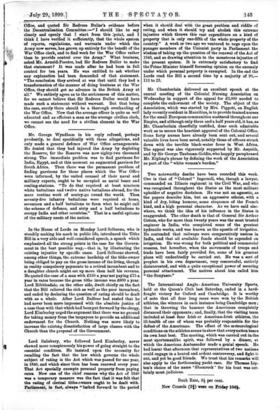In the House of Lords on Monday Lord Selborne, who
is steadily making his mark in public life, introduced the Tithe Bill in a very able and well-considered speech, a speech which emphasised all the strong points in the case for the Govern- ment in the best possible way,—that is, by illustrating the existing injustice by specific cases. Lord Selborne showed, among other things, the extreme hardship of the tithe-owner being obliged to pay on the gross income of the living, though in reality compulsory payments to a retired incumbent and to a daughter church might eat up more than half his revenue. He quoted the case of a man with £150 a year net paying £75 a year in rates because the gross tithe income was £600 a year. Lord Ribblesdale, on the other Bide, dwelt chiefly on the fact that the Bill relieved the rich as well as the poor incumbent, and ended by declaring the question of rating should be dealt with as a whole. After Lord Balfour had stated that he had never been more impressed with the absolute justice of a case than with that which had been put forward by the clergy, Lord Kimberley urged the argument that there was no ground for taking money from the taxpayers to provide an additional endowment for the Church. Nothing was more likely to increase the existing dissatisfaction of large classes with the Church than the proposal of the Government.


































 Previous page
Previous page